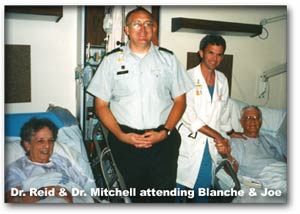Keep A Medical Journal
Each time we visited the military adult medicine clinic, they would ask about medicine and allergies, even though they had the medical records in front of them as well as in their computer. However, they didn't always update dosage changes agreed upon by phone or email. So when they asked, I would whip out my Palm Pilot and read it off. Later, I put the information in an Excel spreadsheet (medication, dosage, frequency, dates) and printed it off just before the doctor visit. That saved me from having to recite it verbally.
One doctor resisted my intrusion. "Your father and I have already discussed this and I've answered his questions." I stood my ground, reminding the doctor that Dad couldn't remember any previous conversations and that I was now responsible for his care. Any decisions about his treatment now and in the future would have to be made with me in the loop. The doctor backed down and began to dialog with me.
Although I began as a thorn in their flesh, all of Dad and Mom's doctors eventually became my strongest supporters. One said to us, "Your Dad and Mom would have only lasted six months if it had not been for your care and concern." (My mother lived over 2 years after being diagnosed with congestive heart failure. My father lasted over 3 years.)
 Dad and Mom's primary physician happened to be the chief instigator of a pilot project among military doctors to exchange email with their patients. Many matters (like dosage adjustments) can be taken care of by a simple email exchange. It's much more efficient than tracking down the doctor by phone or trying make an office appointment. The ordeal of just going to the doctor was often exhausting for my parents (and unnecessary). I believe having the email option was invaluable in caring for my parents. MORE> Dad and Mom's primary physician happened to be the chief instigator of a pilot project among military doctors to exchange email with their patients. Many matters (like dosage adjustments) can be taken care of by a simple email exchange. It's much more efficient than tracking down the doctor by phone or trying make an office appointment. The ordeal of just going to the doctor was often exhausting for my parents (and unnecessary). I believe having the email option was invaluable in caring for my parents. MORE>
|
|

